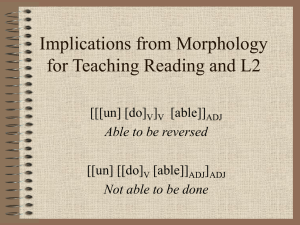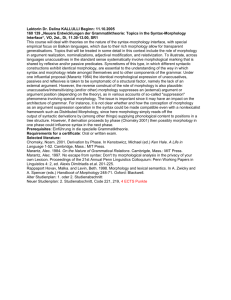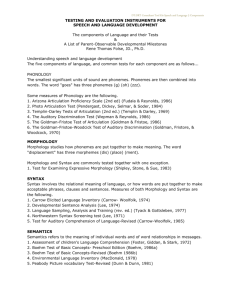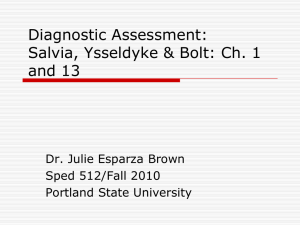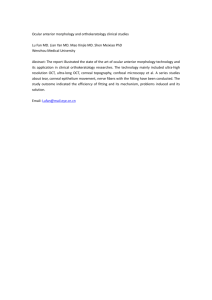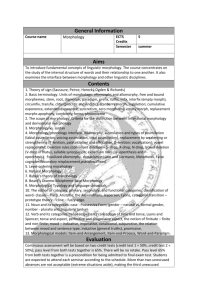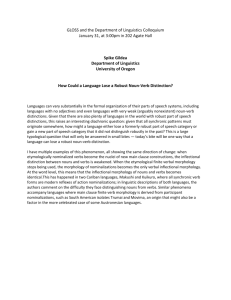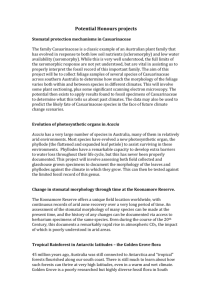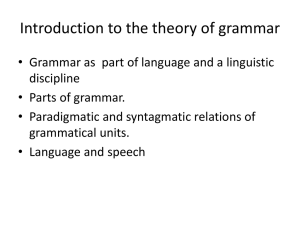course plan MS - WordPress.com
advertisement
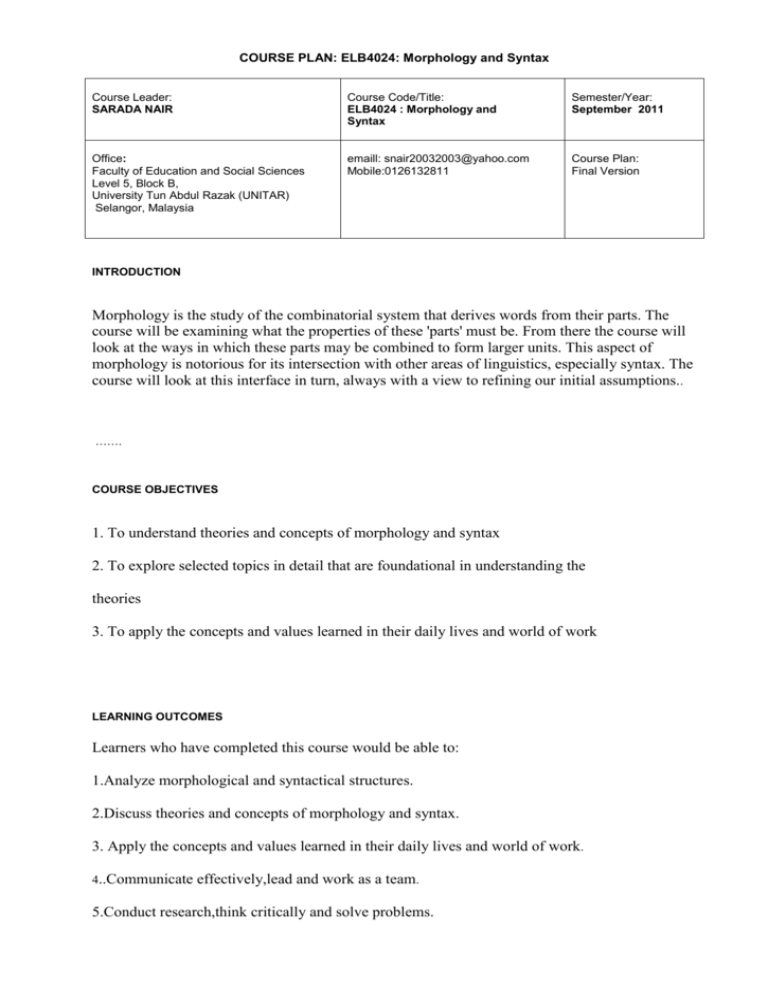
COURSE PLAN: ELB4024: Morphology and Syntax Course Leader: SARADA NAIR Course Code/Title: ELB4024 : Morphology and Syntax Semester/Year: September 2011 Office: Faculty of Education and Social Sciences Level 5, Block B, University Tun Abdul Razak (UNITAR) Selangor, Malaysia emaill: snair20032003@yahoo.com Mobile:0126132811 Course Plan: Final Version INTRODUCTION Morphology is the study of the combinatorial system that derives words from their parts. The course will be examining what the properties of these 'parts' must be. From there the course will look at the ways in which these parts may be combined to form larger units. This aspect of morphology is notorious for its intersection with other areas of linguistics, especially syntax. The course will look at this interface in turn, always with a view to refining our initial assumptions.. ……. COURSE OBJECTIVES 1. To understand theories and concepts of morphology and syntax 2. To explore selected topics in detail that are foundational in understanding the theories 3. To apply the concepts and values learned in their daily lives and world of work LEARNING OUTCOMES Learners who have completed this course would be able to: 1.Analyze morphological and syntactical structures. 2.Discuss theories and concepts of morphology and syntax. 3. Apply the concepts and values learned in their daily lives and world of work. 4..Communicate effectively,lead and work as a team. 5.Conduct research,think critically and solve problems. TEXT BOOKS Shorrocks, G., Morphology and Syntax Vol 2, Lang, Peter Publishing, Incorporated. 1999. Simon-Vandenbergen, A, Davidse, K. (Ed) and Dirk Noel (Ed), Reconnecting Language : Morphology & Syntax Functional Perspective. Benjamins, John Publishing Company, 1997. Payne, T. E. Describing Morphosyntax : A Guide for Field Linguists. Cambridge University Press, 1997. Haspelmath, M. Understanding Morphology. Arnold, Edward, 2002. 5. Kemenade, A. V. and Vincent, N. (Ed) Parameters of Morphosyntactic Change, Cambridge University Press, 1997. Brown, K. And Miller, J. V. Syntax : Linguistic Introduction to Sentence Structure. Routledge, 1999. COURSE ASSESSMENT Non-cognitive Assessment (Character, Attendance) Coursework (Continuous Assessment i.e. Quiz, Assignment, Exercises, etc.) Mid Semester Test Final Examination 5% 25% 20% 50% COURSE/ATTENDANCE POLICY Students are required to abide by the University’s Academic Regulations pertaining to all matters during their course of study. Example: You are expected to fulfill the following requirements of the course to obtain a grade: Participation (5%) Students are required to participate actively in class discussion, exercises, assignment presentations and other class activities. It is just not enough to read and study the lectures given by the instructor, or to participate mentally in the discussion without voicing out your opinions or relating your own experiences. Forums/Research (5%) You are required to participate in the online forums scheduled in the semester. You need to access the Blog and respond to the issues posted and/or published. Your answers to the questions should be based on research. Project (20%) Each student is required to work with other team members. Details of this of this will be posted in the Blog. Mid-Semester Examination (20%) You will be examined on your level of understanding and knowledge acquired including week 6 of the semester. The format of the examinations will include essay and/or discussion type of questions. Final Examination (50%) You will be examined on your level of understanding and knowledge acquired in this course. The format of the examinations will include essay and/or discussion type of questions. The final exam is comprehensive covering all the topics. Course Policies o Academic Honesty is required of all members of a learning community. Hence, UNITAR will not tolerate cheating or plagiarism on tests, examinations, papers or other course assignments. Students who engage in such dishonesty may be given failing grades or expelled from UNITAR. o Attendance policy o Lateness Optional: Missed exams, missed assignments, make-up assignments, make-up exams, grading, support services, extra credit and disability statement DATE WEEK TOPICS READINGS/QUIZ/ASSIGNMENT / EXAMINATION DATELINES / REMARKS . The morphology domain 22/09/2011 1 - Terms of reference and concepts 6/10/2011 3 . Generative models of morphology and other approaches . Linguistic Morphology 13/10/2011 4 . Morphology and Phonology 2 29/09/2011 Mid Sem Break .Morphology and the Lexicon 20/10/11 27/10/11 5 3/11/11 6 Mid Sem Test 10/11/11 7 .Words and Rules 17/11/11 8 .Topic in Root-and –pattern morphology 24/11/11 9 Morphology Typology 1/12/11 8/12/11 15/12/11 22/12/11 29/12/11 1 0 1 1 . Morphology-syntax(noun incorporation,construct state) Structure and Objects 1 . What Syntax is About 1 . What Syntax is Good For . Syntactic Competence 2 3 1 Categories and Roles 4 1 5-16 .FINAL EXAMINATION Mid Semester Test:

